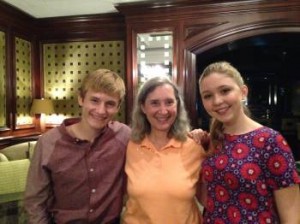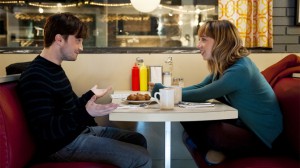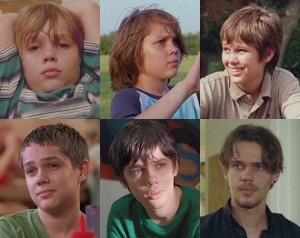Interview: Bill Smitrovich
Posted on October 7, 2014 at 8:00 am
Bill Smitrovich appeared most recently in “The November Man” with Pierce Brosnan as a CIA official with some secrets even his colleagues did not know. He has had an extensive and varied career in theater (“Of Mice and Men”), television (“Life Goes On” and “The Last Ship”), and film (“Independence Day,” “Ghosts of Mississippi,””Iron Man”). He talked to me about creating a character and why his all-time favorite costume included a helmet made from a colander.

You’ve played a lot of law enforcement types. And what do you think it is about your look that makes you so suitable for those roles?
It’s not all about the look but sometimes it’s just about how to deliver the role. If you look a little further into my career, I played everything from a garbage man to the President of the United States. So it’s always kind of weird to think that. And even when I play policemen n they were all different characters in a uniform. It may seem the same to you or the public that I play a lot of characters in uniforms, but each of those men are different men. They are not all the same is what I think.
In “The November Man,” you play a character who personally and professionally keeps a lot of secrets. How do you approach a character like that?
Well, that’s a delicious part of it, playing a character who has a lot of secrets and conflicts. He’s a wonderful actor. And the best compliment I get from the movie is when people will go, “When you turned around in the chair and you were the bad guy was a real “aha moment.” It’s fun playing the perception of the character and then changing it and maybe possibly even changing it back again. People told that they thought that I was a bad guy from the get go and then they didn’t think I was a bad guy then I was a bad guy. So it was just delicious to do that.
It’s like the Vice President in “The Event.” All those secrets that he was keeping and doing it for what he thought was for the greater good. And he might be absolutely off his rocker. I don’t judge my characters. I don’t say they’re off their rocker. But I can’t judge them. All I can do is try to figure out their pure motive for doing what they do and to investigate that and to feel like I am involved with them. I take them on and sometimes a look is certainly helpful. I’ve been working on this a while and I think my experience, my life experience makes a difference because I didn’t get into acting until professional acting until I was like 32 or 33. So I was at a starter theater company. I have a Masters and I did a lot of theater but I never had a equity card or a SAG card or an AFTRA card. I think my life experience nourishes what I do and hopefully colors it and gives me some experience and gravitas in certain situations. But I think that is what comes with each actor that plays a role. You can only bring what we can imagine to the role.
Do you create a back story for your character and try to understand him that way?
In “November Man” the back story was also a part of the movie. They were in the agency together and so they had a back story. And the book helped in defining what that backstory was the ambitions, the risks they took and things of this nature. And then you embellish that. I mean then you look at that past and it enriches and informs what you’re doing in the moment because they had a history. There are things going on inside of each of their minds, especially being in the game, who is going to betray who? But there was a real moment there in their lives where they really trusted one another and got through. And then you have Devereaux’s relationship with Mason, Which is another kind of father-son thing. So it was pretty rich. I mean in terms of relationships, there were high stakes relationships, all of them; wife, Mason, his relationship with Devereaux, my relationship with Weinstein. There was a heart to it because these people did share so much. Not like Bond films, which are just action and sex and the drugs and fast cars.
What’s the best costume you ever had to wear?
In “Life Goes On,” we had a Halloween episode where space aliens came down and was a really funky crazy little kind of Buck Rogers show that we had and it was a lot of fun. And the prop guy made up these costumes. They helmets made out of a spaghetti colander. They had flashing lights on the front and wires coming out the top. And it had a chinstrap – I still wear it at Halloween all the time. I just love it. As far as theatrical costumes are concerned, when I played a garbageman in the theater, I had quite a costume and after a while they had to close the show, it stank so much.
Which director has taught you the most?
Michael Mann I would say. He gave me the opportunity to learn what I had to learn. Great guy, he was very loyal to me, helped me in my career immensely. Roger Donaldson for sure, we’ve done some things together. I think it was more about relationships. But what I learned most was from a teacher and the director of his own little community theater in Stanford Connecticut, his name is Al Pia and he directed me in college and it was my epiphany. It was where I discovered I was an actor. Al taught me how to read a play, how to break it down into beats and scenes and how it moves along. My favorite quote is “All art aspires to music.” And so we talk about beats and the rhythm of a play. It’s all connected and when we speak like that, we can call it a play.
What’s next for you?
I just got done with “Ted 2.” I was in Boston filming for 10 days and it should be coming up probably in July next year, sometime around there I would say. And the TNT show “The Last Ship;” I’ve just done the last couple of episodes for their finale and I’m waiting to see what is going to happen along with everybody else but I will be back.
And what’s the best advice you’ve ever gotten about acting?
If you don’t want to work 9-to-5, you’ve got to hustle 24-7.



